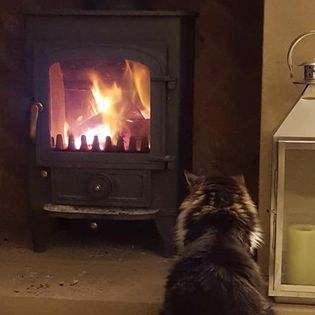Telling Lies

I was recently invited to do a workshop on psychological thrillers. Which got me thinking about some of the main elements of the genre: close personal relationships, the betrayal of trust, emotional intensity, lies, unreliable narrators, deceptive memories, the "twist"... I could do a long list. But the one that jumped out the most was "lies".
I'm currently reading The Science of Storytelling (by Will Storr). A point he makes early on is the way the brain creates stories from the incomplete data it chooses to detect, shaping that data to fit its own expectations. The emphasis here is on "incomplete". Think of that old trick, he says, of the gorilla dancing about on stage and half the audience having no idea he's there because they're focussed on something else.
I use the word shape deliberately. For me, story is another word for shape, arranging what we see to give meaning. Like a word formed from individual letters, or a rainbow emerging from different lines of colour. Our brain is trying to make sense of those edited highlights of the data that comes in, ignoring the vast confusion of blank paper and blue sky that sits beneath.
Always, of course, open to interpretation. Otherwise, it's just data, right?
For most of us, lying is a question of degree. And perspective. What starts as a mechanism of defence, or a ploy to control a situation or desired outcome, becomes a story we might convince ourselves is true. Filtering right from wrong. Isn't memory a biased sequence of stories, too?
It's no coincidence that one of the favourite games used to teach oral storytelling is to ask people to tell a lie, then expand upon it, and build again until that one lie has grown to monstrous proportions. The bigger the lie, the more plausible and enticing the story.
It's one of the reasons I used the odd fairy tale in Cuckoo. The main character, Caro, is herself an illustrator of books. She reads the stories of her latest commission and they trigger their own version of the truth - her emotions, her fears, her growing realisation of what has gone before and what is happening now. Her paintings are a window to her disturbed and awakening state of mind, and a codex to the truth. But whose version?
Our propensity to tell stories, whether fairy tales or in historic records started long before books and modern technologies. Our obsession with lies, truth, meaning and change focuses the brain on what it needs to do to control the world around us. It's the reason why the psychological in "psychological thriller" is there, and why, I believe, the genre remains so popular.
There are no fairy tales in my new book, Magpie. (Well, maybe just one, now I come to think about it. How could I resist?). But there are lots of snippets of folklore, superstition, lies and counter lies and the stories we tell ourselves. And a main character trying to make sense of a world that has collapsed around her. It's been doing my head in!
But then that is kind of the whole point.
Photos: Cuckoo launched in Canada on 30th April as The Stranger in Our Home; Archie the cat playing with a rejected first page of Magpie; This month I've been reading The Woman in the Window by AJ Finn, The Missing by CL Taylor, Vox by Christina Dalcher and The Science of Storytelling by Will Storr.